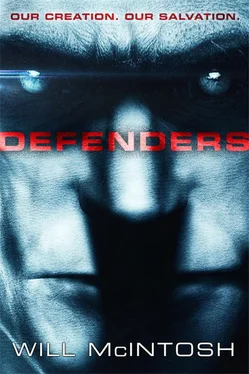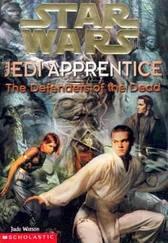The officer stepped between two defenders and peered at the emissaries. “You.” He pointed at Oliver. “You’re Lila’s father.”
“Yes,” Oliver said.
“Erik? It’s Galatea.” She took a step forward. “It’s good to see you.”
“We’re not combatants,” Alan chimed in. “We had no idea this would happen.”
“Do you know where Lila is?” Erik asked, ignoring them. He sounded ready to tear Oliver’s head off and crush it in his fist.
“We haven’t seen her since before—” Oliver stammered, not wanting to use the word invasion , or attack . “Since things went bad.”
Erik motioned to his troops. His meaning was evident: Kill them.
Oliver held up his hands. “I can help you find her. I know places she might be. Don’t hurt Galatea, Alan, and Sook. Take them into custody, and I’ll help you.” He named each of his companions intentionally. It was harder to kill people if you knew their names. He didn’t know if that applied to defenders.
“Lila is strategically valuable. We need her,” Erik said, as if someone had questioned his motives.
“Yes, I understand that,” Oliver said. “Let me help you find her.”
Erik eyed them from under his heavy brow. “Why?” Erik asked. “Why did you do this?”
How could Oliver answer a question like that? A truthful answer could get them all killed. Silence wouldn’t improve their odds, either.
Alan started to answer, but Oliver spoke over him. “You asked for too much.”
Erik glared at him. “We asked to be treated as equals. We asked for respect. You gave us parades, but you don’t want to live with us as equals. You think we’re a joke.”
Behind Erik, a series of huge aircraft roared by. Erik turned and watched them for a moment. They were heading north, away from the Alliance forces.
“We don’t think you’re a joke,” Oliver said. “We take you very seriously.”
“You will.” Erik studied the emissaries a moment longer, then turned toward one of his men. “Take them into custody.” He pointed at Oliver. “You, come with me.”
June 9, 2045. US Pacific Command Station, Guam.
General Willis rose from his seat. Dominique guessed that, in the general’s mind, he was springing from his seat, but the truth was that his aging legs didn’t have much spring left in them.
Squinting, Willis approached the satellite feed, where a number of enemy aircraft were traveling north. Dominique guessed they were planning to attack the enormous Alliance fleet from the rear.
Dominique sat ramrod straight, watching the feed, still unable to accept that this was really happening. They’d attacked the defenders. The defenders .
The aircraft just kept going. Up the coast, out over the Coral Sea.
“ They’re running ,” Willis said, sounding almost jubilant. He’d been slumped in his chair since the defenders’ coastline antiaircraft system had picked off all fifty-six of the bombers carrying nuclear warheads. He shouldn’t have been surprised—the US had almost perfected a spectroscopic technique for remote detection of nuclear weapons before the Luyten invasion had derailed the program. The defenders had been granted full access to US military databases during the desperate days of the war.
Dominique watched the feed. “Where are they running to ?”
No one answered. The defenders had no safe harbor outside Australia.
More aircraft appeared, following the same route.
In Melbourne to the south, a fleet of defender warships hugged the coast, avoiding Alliance forces. Pacific Command hadn’t known about those warships. Thanks to the cloak, all they had was what the emissaries on the ground had told them. They had no idea how large the defender army actually was.
Dominique watched the aircraft. What were they up to? If they pulled a substantial part of their forces out of Australia, the Alliance would take it in a matter of days. Dominique pinched the bridge of her nose, trying to think like a defender. They were fighters. They were ruthlessly aggressive. They—
“They’re going on the offensive,” Dominique said aloud.
Everyone in the war room looked at her. Mouths fell open. Admiral Adler cursed under her breath.
“They’re just going to cede Australia to us?” Willis asked, pointing at the blips that represented the Alliance ships and aircraft, a force ten times larger than any ever before assembled in one place.
“Humans always protect their homeland, because they have no choice,” Dominique said. “They can’t leave their children behind, their parents. Defenders have no children to protect, no old people.”
On the virtual map, some of the defender aircraft headed west, between Australia and Papua New Guinea. Others split off and headed east, toward the Pacific. Closer to Sydney, several Alliance aircraft carriers were flashing red on the map.
“What’s going on there?” Willis asked, pointing at the carriers.
Laura Dramis, their tech, zoomed in, giving them a tight aerial view of one of the aircraft carriers. It was canted at a thirty-degree angle, sinking.
“Holy shit. Did they get hit by aircraft, or rockets? Why didn’t our perimeter defenses take them out?” Willis asked.
Peter Hernandez spoke directly to someone in the fleet in a quick, clipped exchange. He spun in his chair. “The attack came from underwater, but sonar did not detect any foreign bodies below. There are reports of defenders surfacing in big sacks , like the ones the Luyten used.”
That they had weapons based on Luyten technology shouldn’t have surprised anyone. The report from their weapons expert on the ground had said as much. But that wasn’t the problem right now; the problem was the conventional defender aircraft and warships leaving Australia. Yet more were taking flight out of New South Wales, heading due north.
“Get every ship to send some butterfly cameras under that water, see if they can locate the enemy visually.” Willis reached out, squeezing the air like he was clutching a shoulder. “No. First, tell them to detonate depth charges, tight in, close to their ships. Detonate them as shallowly as possible.”
“General, you need to redeploy your forces,” Dominique said, interrupting. “Most of the world’s major population centers are defenseless right now.” She couldn’t believe the Alliance had put him in charge of the invasion. How did these old, incompetent relics always manage to retain power?
General Willis glared at her, then swept a backhand at the map. “I can see it as well as you can, Miss Wiewall. I’m not blind.”
No, he was just an idiot.
“You’re here to provide insight into the defenders, not advise on military strategy. Now let me do my job.”
He went on arranging for the defense of their naval forces as precious minutes ticked by. He went about it methodically, deliberately, as if to show Dominique who was in charge.
“ Now ,” he said, finally, dipping his head toward Dominique in mock deference, “divert forces to pursue the unfriendlies leaving the vicinity. Send warnings to strategically significant targets and major population centers to be on full alert.”
Dominique realized that by threatening the general’s ego, she’d delayed the deployment by ten or twelve minutes. They were on their way now, though. She relaxed, but not much. She’d pictured this war taking place in Australia. How foolish of her. She of all people should have known better.
She of all people. When the president refused to let her be part of the diplomatic mission to Australia, she should have tried harder to change his mind. Maybe she could have defused the situation before it even started.
Читать дальше












